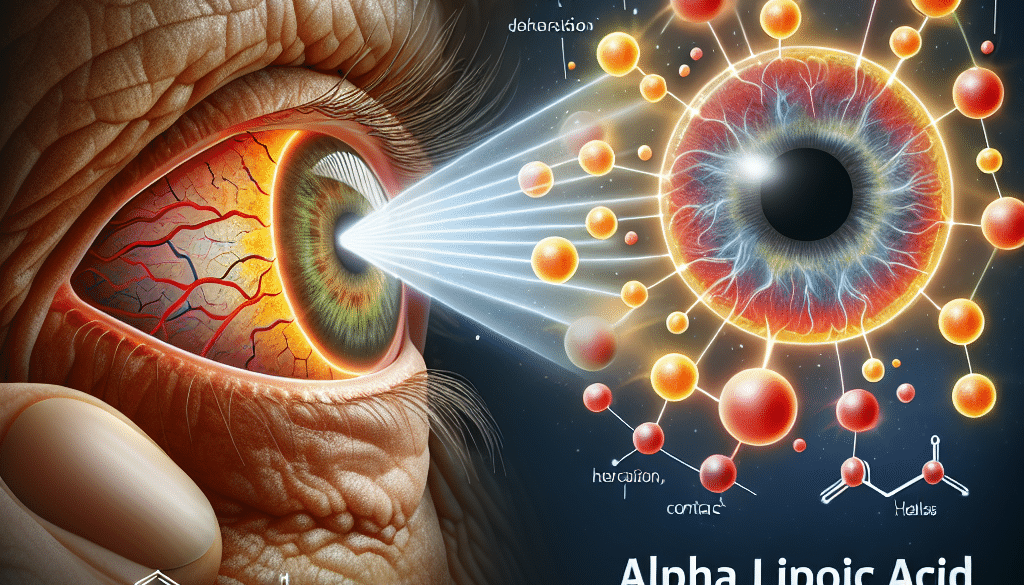Alpha Lipoic Acid Macular Degeneration Benefits
-
Table of Contents
- Alpha Lipoic Acid: A Potential Ally Against Macular Degeneration
- Understanding Macular Degeneration
- The Role of Antioxidants in Eye Health
- Alpha Lipoic Acid: An Overview
- Alpha Lipoic Acid and Macular Degeneration: The Connection
- Scientific Evidence Supporting ALA’s Benefits for AMD
- Case Studies and Personal Accounts
- Considerations and Recommendations
- Conclusion: Alpha Lipoic Acid’s Role in Combating Macular Degeneration
- Discover ETchem’s Protein Products
Alpha Lipoic Acid: A Potential Ally Against Macular Degeneration

Macular degeneration is a major cause of vision loss, especially among the elderly. As the population ages, the prevalence of this condition is expected to rise, prompting a search for effective treatments and preventive measures. Alpha lipoic acid (ALA), a naturally occurring compound with antioxidant properties, has emerged as a potential ally in this fight. This article explores the benefits of alpha lipoic acid in the context of macular degeneration, supported by scientific research and clinical studies.
Understanding Macular Degeneration
Macular degeneration, also known as age-related macular degeneration (AMD), is a condition that affects the central part of the retina, known as the macula. The macula is responsible for sharp, central vision, which is crucial for activities like reading, driving, and recognizing faces. There are two main types of AMD: dry (atrophic) and wet (neovascular). While the dry form is more common and progresses slowly, the wet form can lead to rapid vision loss.
The Role of Antioxidants in Eye Health
Antioxidants play a crucial role in maintaining eye health by neutralizing free radicals—unstable molecules that can damage cells, including those in the retina. The retina is particularly susceptible to oxidative stress due to its high metabolic activity and exposure to light. Therefore, antioxidants are considered vital in the prevention and management of conditions like AMD.
Alpha Lipoic Acid: An Overview
Alpha lipoic acid is a powerful antioxidant that is both water- and fat-soluble, allowing it to work in various parts of the body. It is found in small amounts in foods like spinach, broccoli, and potatoes, and can also be taken as a dietary supplement. ALA is unique in that it can regenerate other antioxidants, such as vitamin C and vitamin E, extending their effectiveness.
Alpha Lipoic Acid and Macular Degeneration: The Connection
Research suggests that alpha lipoic acid may offer several benefits for individuals with macular degeneration:
- Antioxidant Protection: ALA’s antioxidant properties can help protect the retina from oxidative damage, which is a contributing factor in AMD.
- Anti-Inflammatory Effects: ALA has been shown to have anti-inflammatory effects, which may be beneficial in reducing the inflammation associated with AMD.
- Neuroprotective Qualities: ALA may help protect retinal ganglion cells and photoreceptors, potentially slowing the progression of AMD.
- Chelating Heavy Metals: ALA can bind to heavy metals like iron and copper, which are known to accumulate in the retina and contribute to oxidative stress.
Scientific Evidence Supporting ALA’s Benefits for AMD
Several studies have investigated the potential benefits of alpha lipoic acid for macular degeneration:
- A study published in the journal Free Radical Biology and Medicine found that ALA supplementation improved visual function in patients with AMD.
- Research in the Archives of Gerontology and Geriatrics demonstrated that ALA, in combination with other antioxidants, reduced the progression of AMD.
- Animal studies have shown that ALA can protect against retinal cell death and preserve retinal structure.
While these findings are promising, more research is needed to fully understand the extent of ALA’s benefits for AMD and to establish optimal dosing guidelines.
Case Studies and Personal Accounts
Case studies and personal accounts from individuals with AMD who have used ALA supplements often report improvements in vision and quality of life. These anecdotal reports provide additional support for the potential role of ALA in managing AMD, although they are not a substitute for scientific evidence.
Considerations and Recommendations
Before adding alpha lipoic acid to your regimen for AMD, consider the following:
- Consult with a healthcare professional to determine if ALA is appropriate for your specific condition and to discuss potential interactions with other medications.
- Choose high-quality ALA supplements from reputable manufacturers to ensure purity and potency.
- Be aware of the recommended dosages and possible side effects, such as skin rash or gastrointestinal discomfort.
Conclusion: Alpha Lipoic Acid’s Role in Combating Macular Degeneration
In conclusion, alpha lipoic acid shows promise as a supplement that may offer protective benefits against macular degeneration. Its antioxidant, anti-inflammatory, and neuroprotective properties make it a compelling candidate for further research and potential inclusion in AMD management strategies. While the evidence is encouraging, it is important to approach ALA supplementation with care and in consultation with a healthcare provider.
Discover ETchem’s Protein Products
If you’re looking for high-quality protein products to complement your health regimen, consider ETchem’s range of collagen products. Their offerings are designed to support various aspects of health, including eye health, and are sourced from reputable manufacturers. With a focus on quality and customer satisfaction, ETchem is a trusted supplier for all your protein needs.
About ETChem:
ETChem, a reputable Chinese Collagen factory manufacturer and supplier, is renowned for producing, stocking, exporting, and delivering the highest quality collagens. They include marine collagen, fish collagen, bovine collagen, chicken collagen, type I collagen, type II collagen and type III collagen etc. Their offerings, characterized by a neutral taste, instant solubility attributes, cater to a diverse range of industries. They serve nutraceutical, pharmaceutical, cosmeceutical, veterinary, as well as food and beverage finished product distributors, traders, and manufacturers across Europe, USA, Canada, Australia, Thailand, Japan, Korea, Brazil, and Chile, among others.
ETChem specialization includes exporting and delivering tailor-made collagen powder and finished collagen nutritional supplements. Their extensive product range covers sectors like Food and Beverage, Sports Nutrition, Weight Management, Dietary Supplements, Health and Wellness Products, ensuring comprehensive solutions to meet all your protein needs.
As a trusted company by leading global food and beverage brands and Fortune 500 companies, ETChem reinforces China’s reputation in the global arena. For more information or to sample their products, please contact them and email karen(at)et-chem.com today.




